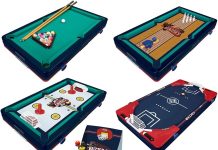Have you ever found yourself standing in front of an air hockey table, staring at the flying puck and wondering, “Is air hockey hard?” We understand the curiosity that strikes every novice player as they embark on this thrilling, fast-paced game. In this article, we will explore the challenges of air hockey, from mastering the art of controlling the puck’s movement to honing your hand-eye coordination. Get ready to discover the techniques and skills required to make your mark on the air hockey table! As a popular recreational game, many people wonder whether air hockey is a difficult sport to play. Well, the answer is subjective and may vary from person to person. However, we’re here to provide you with a comprehensive guide that will help you understand the different aspects of air hockey and decide for yourself. So, let’s delve into the world of air hockey and explore the skills and techniques, physical demands, equipment, strategy and tactics, common challenges, mental focus, learning curve, and tips for beginners.
Review contents
Skills and Techniques
Basic Technique
When starting with air hockey, it’s essential to grasp the basic technique. This involves having a balanced stance, gripping the paddle properly, and utilizing the wrist snap technique for quick and accurate shots. By practicing these fundamentals, you can improve your gameplay significantly and set a foundation for advanced techniques.
Advanced Techniques
For seasoned players looking to elevate their skills, learning advanced techniques is crucial. This includes mastering the art of defense, executing powerful offensive moves, and reading your opponents to anticipate their strategy. Advanced techniques may require more practice and experience, but they can make a noticeable difference in your gameplay.
Physical Demands
Quick Reflexes
Air hockey requires lightning-fast reflexes as the game moves at a rapid pace. You must react quickly to block shots, intercept the puck, and launch counter-attacks. By continuously challenging your reflexes, you can enhance your performance on the table.
Hand-Eye Coordination
Hand-eye coordination is another vital aspect of air hockey. The ability to track the fast-paced puck while simultaneously manipulating your paddle requires precise hand-eye coordination. Regular air hockey practice helps improve this essential skill.
Aerobic Fitness
Although air hockey doesn’t demand the same level of physical exertion as some other sports, it still offers some aerobic benefits. The dynamic nature of the game keeps players on their feet, engaging their muscles and getting their heart rate up. By participating in regular air hockey sessions, you can improve your overall aerobic fitness.
This image is property of static01.nyt.com.
Equipment
Air Hockey Table
A high-quality air hockey table is essential for a great gaming experience. Look for a well-constructed table with a smooth playing surface and powerful air blowers to ensure optimal puck movement and speed.
Paddles
Paddles, also known as mallets, significantly influence your gameplay. Choose paddles that feel comfortable in your hands and provide a good grip. The weight and balance of the paddle can also impact your maneuverability, so finding the right paddle for your playing style is important.
Pucks
Pucks should glide effortlessly across the table, offering the right amount of speed and control. Look for pucks made of durable materials that won’t easily wear out. It’s also advisable to have multiple pucks on hand to avoid any interruptions during gameplay.
Strategy and Tactics
Defensive Tactics
Defensive tactics are crucial in air hockey to prevent your opponent from scoring. Strategies such as blocking shots, maintaining a strong defensive position, and anticipating your opponent’s moves are key. Mastering defensive tactics can help you control the game and frustrate your opponent’s offensive efforts.
Offensive Tactics
On the flip side, offensive tactics are vital for scoring goals. Executing powerful shots, using angles strategically, and exploiting your opponent’s weaknesses can give you the upper hand. Developing offensive strategies will allow you to maintain pressure and keep your opponent on their toes.
Reading Opponents
Being able to read your opponents is a valuable skill in air hockey. By observing their body language, paddle movements, and shot patterns, you can anticipate their next move. This insight enables you to adjust your strategy, improve your defense, and launch effective counter-attacks.
This image is property of recroompick.com.
Common Challenges
Scoring Goals
One of the most common challenges in air hockey is scoring goals consistently. It requires a combination of precision, timing, and strategic thinking. Mastering offensive techniques, practicing shot accuracy, and understanding your opponent’s defense can help you overcome this challenge.
Controlling Puck Movement
Controlling the puck’s movement can be tricky, especially when playing against skilled opponents. By developing a light touch on the paddle, improving your positional play, and anticipating the puck’s trajectory, you can gain better control over its movement.
Defending Against Shots
Defending against shots can be a challenge, as your opponent may employ various offensive tactics to throw you off-guard. However, by staying focused, maintaining a solid defensive position, and adapting quickly, you can significantly enhance your ability to block shots.
Mental Focus
Concentration
Maintaining concentration throughout the game is vital in air hockey. With the fast-paced nature of the sport, it’s easy to get distracted or lose focus. By training your mind to stay engaged, you can react swiftly to your opponent’s moves, make better decisions, and avoid unnecessary mistakes.
Decision Making
Quick decision-making skills are essential in air hockey. You must analyze the game, anticipate your opponent’s actions, and make split-second choices. Regular practice helps improve your decision-making abilities, leading to more effective gameplay.
Handling Pressure
Handling pressure is crucial, especially in competitive air hockey matches. When the game is on the line, keeping your nerves in check is essential to maintain composure and execute your strategies flawlessly. Building mental resilience through practice and experiencing different game situations can help you handle pressure more effectively.
This image is property of recroompick.com.
Learning Curve
Beginner’s Learning Curve
For beginners, the learning curve in air hockey can be steep. Understanding the game rules, mastering basic techniques, and getting accustomed to the fast-paced gameplay takes time. However, with patience, regular practice, and dedication, you can progress quickly and enjoy the game to its fullest.
Improvement Curve
As you gain experience and improve your skills, the learning curve becomes less challenging. Consistent practice, analyzing your gameplay, and seeking guidance from experienced players can help you maintain a steady improvement curve. Embrace each opportunity to learn and grow, and you’ll continue to refine your air hockey abilities.
Tips for Beginners
Master Basic Technique First
The most important tip for beginners is to focus on mastering the basic techniques before moving on to advanced moves. Building a strong foundation will contribute to your long-term success in air hockey. Spend ample time practicing your stance, grip, and wrist snap technique to develop accuracy and consistency in your shots.
Practice Regularly
Regular practice is key to improving your skills in any sport, and air hockey is no exception. Set aside dedicated practice sessions to hone your skills, challenge yourself, and improve your reflexes. The more time you invest in practicing, the better your gameplay will become.
Watch and Learn from Experts
One effective way to accelerate your progress in air hockey is to watch and learn from experts. Study their techniques, observe their strategies, and analyze their gameplay. By incorporating elements of their style into your own, you can enhance your skills and develop your unique playing style.
This image is property of sp-ao.shortpixel.ai.
Benefits of Air Hockey
Physical Health Benefits
While air hockey may not be the most physically demanding sport, it still offers several health benefits. The fast-paced nature of the game keeps players active, engages various muscle groups, and can contribute to overall fitness. Regular air hockey sessions can help improve hand-eye coordination, reflexes, and even provide a fun way to burn some calories.
Mental Health Benefits
Air hockey also provides several mental health benefits. It offers a way to unwind, relieve stress, and engage in enjoyable competition. The focus required to play air hockey can help clear the mind and promote mental well-being. Moreover, the satisfaction of improving your skills and achieving goals in the game can boost self-confidence and self-esteem.
Social Interaction
Air hockey is a game that can be enjoyed with friends, family, or even new acquaintances. Engaging in friendly competition and sharing moments of excitement creates a sense of camaraderie and fosters social interaction. The game provides an opportunity to strengthen relationships, make new connections, and create lasting memories.
In conclusion, whether air hockey is hard or not depends on various factors such as your experience, skill level, and dedication to practice. By understanding the skills and techniques, physical demands, equipment, strategy and tactics, common challenges, mental focus, learning curve, and tips for beginners, you can embark on your air hockey journey with confidence. Whether you’re looking for a fun recreational activity or aspire to compete at a higher level, air hockey offers an exciting and enjoyable experience for players of all ages and skill levels. So, grab a paddle, step up to the table, and let the exhilarating world of air hockey unfold before you!



























![Best Outdoor Dartboards [Reviews and Buying Guide 2024] Best Outdoor Dartboards](https://gamersets.com/wp-content/uploads/2022/12/Best-Outdoor-Dartboards-100x70.jpg)

![Best Mini Air Hockey Table [Reviews & Buying Guide 2024] Best mini air hockey table](https://gamersets.com/wp-content/uploads/2022/10/Best-mini-air-hockey-table-100x70.jpg)







